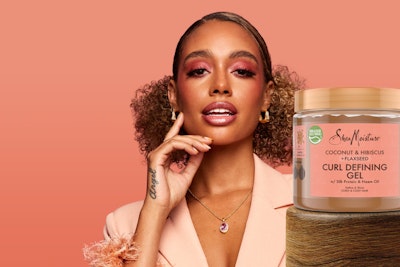Shea Moisture
Hair and body products for textured hair and melanin-rich skin

Shea Moisture's Sustainability Rating
Acceptable
Ingredients
Shea Moisture has made ingredient commitments to lower its environmental impact, including by avoiding parabens, phthalates, and select other petrochemical-based ingredients. Its parent company, Unilever, has commitments to avoid uncertified palm oil and microplastics. However, Shea Moisture still uses some other petrochemical-based ingredients ingredients that pose a significant threat to the climate, including SLS and avobenzone, a harmful suncare ingredient. Its products incorporate bio-based and/or organic ingredients, as well as Fair for Life certified shea butter. It no longer holds PETA certification, but claims that its products are still cruelty-free. Shea Moisture is a B Corp.
Containers & Packaging
Shea Moisture doesn't share any information on its packaging materials or disclose efforts to concentrate its products or minimize its containers. Its parent company, Unilever, has some organization-wide goals to increase the use of recycled packaging by 2025.
Energy & Water Use
Shea Moisture's parent company, Unilever, shares information on its overall energy strategy. It uses some renewable energy to power its production sites and corporate offices, and has targets for expanding its use of renewable energy by 2030. It implements water conservation measures, including water stewardship programs and working with the Alliance for Water Stewardship. Shea Moisture has a global production span, which is standard for the industry.
Refill & Reuse
Shea Moisture doesn't utilize any alternative models or methods to avert waste. It offers bulk sizes for some products, which may help reduce packaging waste.
Slow Cleaning
It's unclear if this brand releases new items seasonally or otherwise frequently, which can create excess waste.
Marketing
Commons is still evaluating this brand's marketing emails.
Transparency & Reporting
Shea Moisture has a page with high-level details on its sourcing strategy, but it doesn't have an overall sustainability page. It previously published an annual report with a focus on its charitable partnerships, but hasn't released one since 2022. Its parent company, Unilever, publishes a detailed annual report with a clear, impact-driven strategy and progress reporting. Its last annual report was published in 2023. Shea Moisture shares a complete list of ingredients used in its products, on a per product basis.
Emissions Tracking
Shea Moisture's parent company, Unilever, internally measures and publicly reports its company-level emissions in partnership with, or with auditing from, a third party. It includes a breakdown by scope and identifies its top driver of emissions. In its 2023 update, its estimated emissions footprint was 110,153,969 tons CO2e.
Targets & Offsets
Shea Moisture's parent company, Unilever, has SBTi-approved emissions reduction targets for the medium-term (5-10 years) and long-term (10+ years). It has reported on its progress within the past year, and is on track for some of its targets. Its overall net-zero commitment was removed by SBTi. Commons couldn't find evidence that this brand offsets any emissions.
Supply Chain & Labor
Shea Moisture publishes limited information about its supply chain partners, disclosing some locations and the name of a key supplier. It has labor certifications within its supply chain, including Fair Trade, and it commits to paying above-market premiums to the women in its sourcing cooperatives. Its parent company, Unilever, publicly shares a supplier code of conduct, which prohibits forced labor, ensures the right to collective bargaining, prohibits child labor, establishes grievance mechanisms, and includes environmental clauses. Its code of conduct doesn't resrict unauthorized subcontracting or ensure a living wage. Unilever doesn't have a stated policy of regularly auditing its supply chain partners. This may increase human and environmental risks.
Advocacy
Shea Moisture's parent company, Unilever, discloses all of its trade association memberships, including those that are climate-obstructive. It's a member of 1 large climate-obstructive trade association: Personal Care Products Council. It isn't a member of advocacy organizations advancing climate policy. Unilever doesn't employ any state lobbyists and it didn't donate more than $100k to climate-obstructive candidates or PACs from 2018-2024.
Shea Moisture is rated Fair because it has started to improve its ingredients, but still has room to grow.
Shea Moisture has committed to avoiding select ingredients that pose a threat to the climate, including parabens, phthalates, and select petrochemical-based ingredients, but it still uses some other petrochemical-based ingredients, such as SLS. It uses some Fair Trade ingredients and pays above-market premiums to women in its sourcing cooperatives. Shea Moisture's parent company reports on its emissions and energy strategy, and has SBTi-approved emissions reduction targets.
However, Shea Moisture doesn't disclose enough information about its packaging materials. It appears to use plastic packaging of a virgin or undisclosed source, which contributes greatly to waste production and excess energy use. It also doesn't utilize any alternative models or packaging minimization strategies to reduce its waste and emissions footprint.
Shea Moisture is owned by Unilever.
Our ratings are based on a scale from 1 (bad) to 5 (best). How we rate →
https://www.sheamoisture.com/us/en/ethical-sourcing.html
https://www.sheamoistureuk.com/our-ingredients.html
https://www.sheamoistureuk.com/ethical-sourcing.html
https://www.unilever.com/files/92ui5egz/production/b09c3510ee7cec58440d5f044f02bdefe85aa186.pdf
https://www.unilever.com/files/unilever-annual-report-and-accounts-2024.pdf
https://www.sheamoisture.com/us/en/faqs.html
https://www.bcorporation.net/en-us/find-a-b-corp/company/sundial-brands-llc/
https://www.unilever.com/files/66bc4aea-608f-46ee-8da3-cde0ec8ebe90/unilever-annual-report-and-accounts-2023.pdf
https://www.unilever.com/sustainability/nature/#improving-water-security
https://assets.unileversolutions.com/v1/130751025.pdf https://www.unilever.com/sustainability/responsible-business/sustainability-performance-data/
https://www.unilever.com/sustainability/responsible-business/sustainability-performance-data/
https://sciencebasedtargets.org/target-dashboard
https://trellis.net/article/microsoft-pg-unilever-and-walmart-among-239-companies-miss-net-zero-deadline/
https://www.sheamoistureuk.com/ethical-sourcing.html https://www.unilever.com/files/unilever-annual-report-and-accounts-2024.pdf https://www.unilever.com/files/e6e301e3-7e20-4363-b6aa-ef0f4a4e3322/responsible-sourcing-policy-interactive-final.pdf
https://www.hul.co.in/files/hul-business-responsibility-sustainability-report-fy-2023-24.pdf
https://transparency-register.europa.eu/searchregister-or-update/organisation-detail_en?id=6200524920-25
https://www.personalcarecouncil.org/about-us/member-companies/
https://fminus.org/lobbyists/
https://www.fec.gov/data/browse-data/
Get Rewards
Earn for sustainable purchases
Commons rewards you for sustainable purchases from all our Top Rated brands, plus thousands of everyday purchases — from thrift stores to public transit.
Learn more about rewards ->







